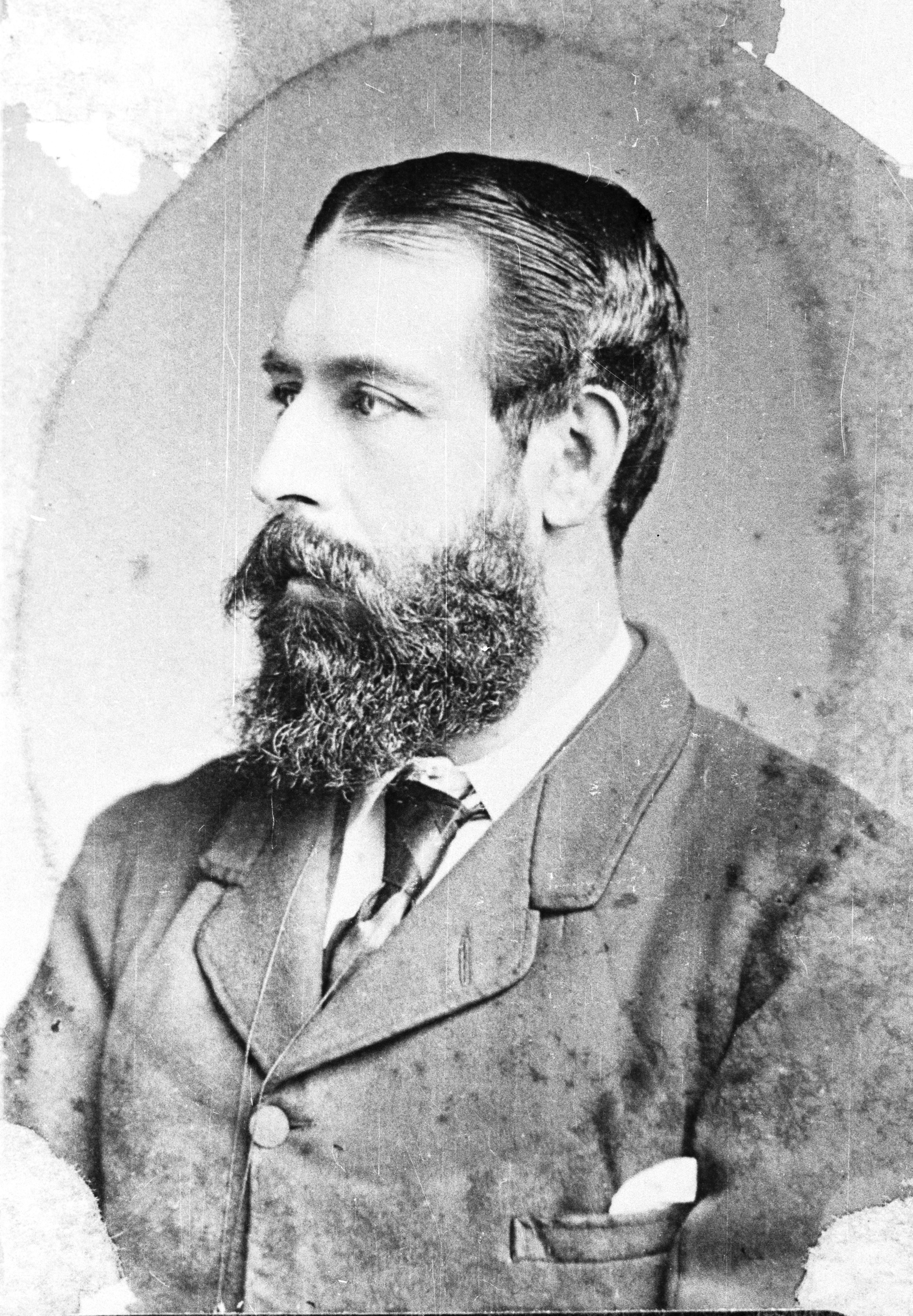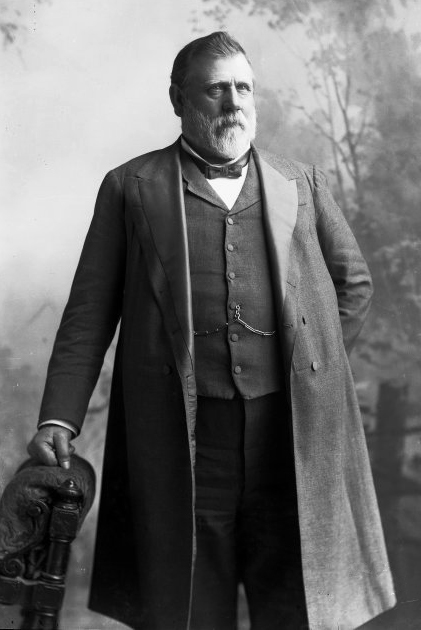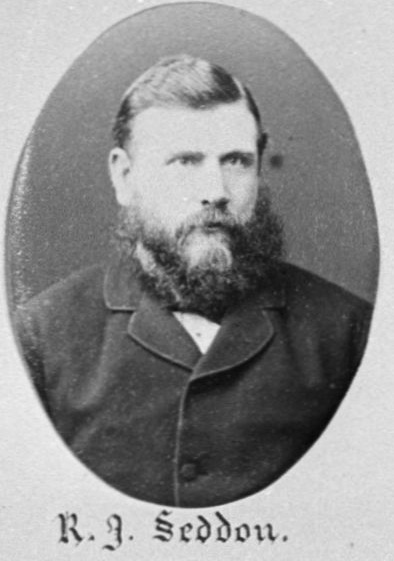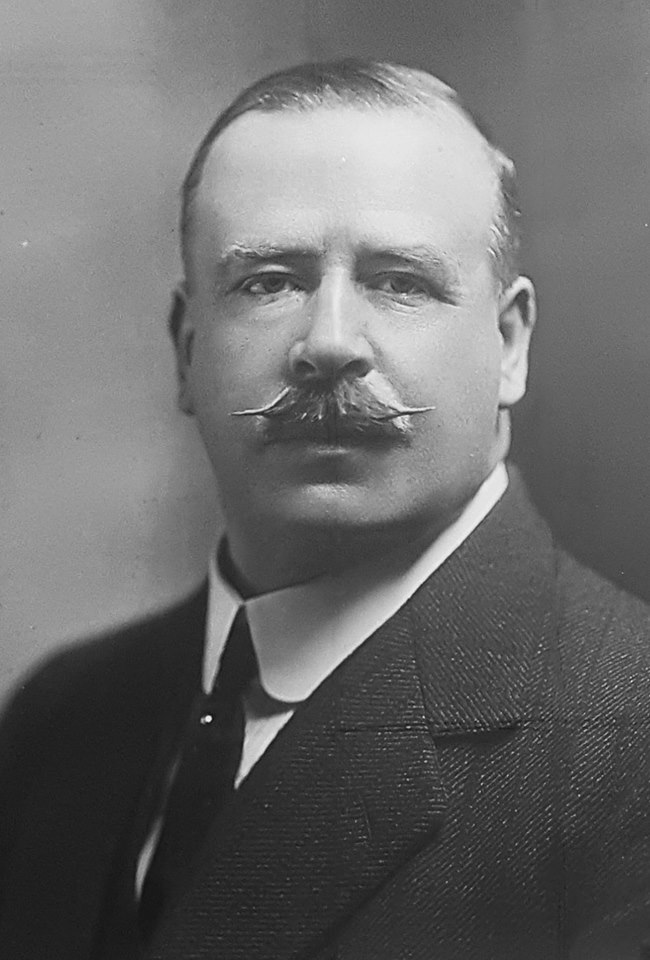|
Alfred Dillon
Alfred Dillon (1841 – 13 November 1915) was a Liberal Party Member of Parliament in New Zealand. Historian David Hamer remarked that Dillon was the prime example of a " Seddonian" Liberal politician, due to humble, rustic background and appeal as a "man of the people". Biography Early life Dillon was from humble origins in Wales before moving to New Zealand in 1857. There, he worked for years as a farm labourer, bullock driver and carrier before acquiring land; he was a rarity amongst Liberals as a runholder with about . A poor speaker and sneered at by William Russell as illiterate, he appealed as a "man of the people" who had made his way by his own efforts. He retained the image of the rugged pioneer; short, barrel-chested, bushy-bearded and usually clad in thick country tweeds. Political career Dillon won the Hawkes Bay electorate in 1905, beating the oligarchical Leader of the Opposition William Russell, but was defeated six years later in 1911 A notable on ... [...More Info...] [...Related Items...] OR: [Wikipedia] [Google] [Baidu] |
Hawkes Bay (New Zealand Electorate)
Hawke's Bay was a parliamentary electorate in the Hawke's Bay Region of New Zealand from 1881 to 1996. In 1986 it was renamed Hawkes Bay (without an apostrophe). Population centres The previous electoral redistribution was undertaken in 1875 for the 1875–1876 election. In the six years since, New Zealand's European population had increased by 65%. In the 1881 electoral redistribution, the House of Representatives increased the number of European representatives to 91 (up from 84 since the 1875–76 election). The number of Māori electorates was held at four. The House further decided that electorates should not have more than one representative, which led to 35 new electorates being formed, including Hawke's Bay, and two electorates that had previously been abolished to be recreated. This necessitated a major disruption to existing boundaries. Prior to the 1881 electoral redistribution, the electorate covered not just the town of Napier, but also its rural hinterland. The n ... [...More Info...] [...Related Items...] OR: [Wikipedia] [Google] [Baidu] |
William Russell (New Zealand Politician)
Sir William Russell Russell (12 November 1838 – 24 September 1913) was a New Zealand politician from 1870 to 1905. He was a cabinet minister, and was recognised as Leader of the Opposition from 1894 to 1901. Though considered by other politicians to have little sympathy with working people as a major landowner his panache and involvement in local affairs led him to be liked and admired by Hawkes Bay's élite. Biography Early life and career Russell was born in Sandhurst, Berkshire England and educated at the Royal Military College, Sandhurst. His father Andrew Russell was in the 58th Regiment of Foot, and Russell came with him to New Zealand in the 1840s. He then joined the 58th Regiment, and came to New Zealand as an ensign in 1857. He transferred to the 14th Regiment of Foot and came out to Auckland in 1861, serving until 1862. In 1862 he sold his Captain's commission to settle in Hawkes Bay taking up with his brother 31,000 acres of rolling hill country 25 miles west of ... [...More Info...] [...Related Items...] OR: [Wikipedia] [Google] [Baidu] |
Hugh Campbell (New Zealand Politician)
Hugh McLean Campbell (21 March 1875 – 22 May 1951), sometimes known as HM Campbell, was a Reform Party Member of Parliament in New Zealand. Biography Campbell was born in Te Aute near Pukehou in the Hawke's Bay. His father, Hugh Campbell, was a sheep farmer in Australia, then in Wānaka, and finally in Poukawa south of Hastings. His mother, Margaret Gardiner, died when he was only three years old. He was brought up by his elder sister, Catherine, and Mary Williams, the wife of their neighbour, the missionary Samuel Williams. On 31 January 1900, he married Mildred Rachel Ralston at Carnarvon in the Manawatu. They had three sons and one daughter. Campbell founded the '' Hawke's Bay Tribune'' in 1910 with his brother-in-law, John Chambers, and George Nelson. They encouraged him to become politically active and replace the conservative politician Sir William Russell, who had retired from the electorate at the . Campbell first stood in the Hawke's Bay electorate i ... [...More Info...] [...Related Items...] OR: [Wikipedia] [Google] [Baidu] |
Wales
Wales ( cy, Cymru ) is a Countries of the United Kingdom, country that is part of the United Kingdom. It is bordered by England to the Wales–England border, east, the Irish Sea to the north and west, the Celtic Sea to the south west and the Bristol Channel to the south. It had a population in 2021 of 3,107,500 and has a total area of . Wales has over of coastline and is largely mountainous with its higher peaks in the north and central areas, including Snowdon (), its highest summit. The country lies within the Temperateness, north temperate zone and has a changeable, maritime climate. The capital and largest city is Cardiff. Welsh national identity emerged among the Celtic Britons after the Roman withdrawal from Britain in the 5th century, and Wales was formed as a Kingdom of Wales, kingdom under Gruffydd ap Llywelyn in 1055. Wales is regarded as one of the Celtic nations. The Conquest of Wales by Edward I, conquest of Wales by Edward I of England was completed by 1283, th ... [...More Info...] [...Related Items...] OR: [Wikipedia] [Google] [Baidu] |
New Zealand
New Zealand ( mi, Aotearoa ) is an island country in the southwestern Pacific Ocean. It consists of two main landmasses—the North Island () and the South Island ()—and over 700 smaller islands. It is the sixth-largest island country by area, covering . New Zealand is about east of Australia across the Tasman Sea and south of the islands of New Caledonia, Fiji, and Tonga. The country's varied topography and sharp mountain peaks, including the Southern Alps, owe much to tectonic uplift and volcanic eruptions. New Zealand's capital city is Wellington, and its most populous city is Auckland. The islands of New Zealand were the last large habitable land to be settled by humans. Between about 1280 and 1350, Polynesians began to settle in the islands and then developed a distinctive Māori culture. In 1642, the Dutch explorer Abel Tasman became the first European to sight and record New Zealand. In 1840, representatives of the United Kingdom and Māori chiefs ... [...More Info...] [...Related Items...] OR: [Wikipedia] [Google] [Baidu] |
New Zealand Liberal Party
The New Zealand Liberal Party was the first organised political party in New Zealand. It governed from 1891 until 1912. The Liberal strategy was to create a large class of small land-owning farmers who supported Liberal ideals, by buying large tracts of Māori land and selling it to small farmers on credit. The Liberal Government also established the basis of the later welfare state, with old age pensions, developed a system for settling industrial disputes, which was accepted by both employers and trade unions. In 1893 it extended voting rights to women, making New Zealand the first country in the world to enact universal adult suffrage. New Zealand gained international attention for the Liberal reforms, especially how the state regulated labour relations. It was innovating in the areas of maximum hour regulations and compulsory arbitration procedures. Under the Liberal administration the country also became the first to implement a minimum wage and to give women the right ... [...More Info...] [...Related Items...] OR: [Wikipedia] [Google] [Baidu] |
Member Of Parliament
A member of parliament (MP) is the representative in parliament of the people who live in their electoral district. In many countries with bicameral parliaments, this term refers only to members of the lower house since upper house members often have a different title. The terms congressman/congresswoman or deputy are equivalent terms used in other jurisdictions. The term parliamentarian is also sometimes used for members of parliament, but this may also be used to refer to unelected government officials with specific roles in a parliament and other expert advisers on parliamentary procedure such as the Senate Parliamentarian in the United States. The term is also used to the characteristic of performing the duties of a member of a legislature, for example: "The two party leaders often disagreed on issues, but both were excellent parliamentarians and cooperated to get many good things done." Members of parliament typically form parliamentary groups, sometimes called caucuse ... [...More Info...] [...Related Items...] OR: [Wikipedia] [Google] [Baidu] |
Richard Seddon
Richard John Seddon (22 June 1845 – 10 June 1906) was a New Zealand politician who served as the List of prime ministers of New Zealand, 15th Prime Minister of New Zealand, premier (prime minister) of New Zealand from 1893 until his death. In office for thirteen years, he is to date New Zealand's List of Prime Ministers of New Zealand by time in office, longest-serving head of government. Seddon was born in Eccleston, St Helens, Eccleston near St Helens, Merseyside, St Helens, Lancashire, in England. He arrived in New Zealand in 1866 to join an uncle in the West Coast Gold Rush, West Coast goldfields. His prominence in local politics gained him a seat in the New Zealand House of Representatives, House of Representatives in 1879. Seddon became a key member of the New Zealand Liberal Party, Liberal Party under the leadership of John Ballance, but differed from him greatly due to his Historic conservatism in New Zealand, conservativism clashing with Ballance's progressivism. Wh ... [...More Info...] [...Related Items...] OR: [Wikipedia] [Google] [Baidu] |
1905 New Zealand General Election
The 1905 New Zealand general election was held on Wednesday, 6 December in the general electorates, and on Wednesday, 20 December in the Māori electorates to elect a total of 80 MPs to the 16th session of the New Zealand Parliament. A total number of 412,702 voters turned out, with 396,657 (83.25% of the electoral roll) voting in the European electorates. Changes to the electoral law The 1903 City Single Electorates Act declared that at the dissolution of the 15th Parliament, the four multi-member electorates would be abolished and replaced each with three single-member electorates. It was also the year absentee voting was introduced for all electors unable to be in their own electorate on election day. The first Chief Electoral Officer was appointed. Accordingly, the multi-member urban electorates of , , and were abolished and replaced with the following single-member seats: * * * * * * * * * * * * Nine of these twelve electorates had existed before. Wellington ... [...More Info...] [...Related Items...] OR: [Wikipedia] [Google] [Baidu] |
1911 New Zealand General Election
The 1911 New Zealand general election was held on Thursday, 7 and 14 December in the general electorates, and on Tuesday, 19 December in the Māori electorates to elect a total of 80 MPs to the 18th session of the New Zealand Parliament. A total number of 590,042 (83.5%) voters turned out to vote. In two seats (Eastern Maori and Gisborne) there was only one candidate (not one seat, as in Wilson). Outcome The result was that the Liberal Party, which had won a majority of seats (50 of 80) in Parliament, lost 17 seats and its majority, winning only 33. The Reform Party gained 9 to obtain a plurality (37) of seats. , Elections.org Liberal Prime Minister |
Auckland University Press
Auckland University Press is a New Zealand publisher that produces creative and scholarly work for a general audience. Founded in 1966 and formally recognised as Auckland University Press in 1972, it is an independent publisher based within The University of Auckland, Auckland, New Zealand. The Press currently publishes around 20 new books a year in history and politics, art and architecture, literature and poetry, Māori, Pacific and Asian Studies, science, business and health. It published its 500th book in 2005 of which 22 were prize winning publications. Awards Auckland University Press won the ''Most Beautiful Books Australia & New Zealand Award'' (2013) and its authors have won a number of national prizes. Imprints 1966–1970: Published for the University of Auckland by the Oxford University Press 1970–1986: Auckland University Press/Oxford University Press 1986–: Auckland University Press 1995–1998: a small number of books carried the imprint Auckland Universit ... [...More Info...] [...Related Items...] OR: [Wikipedia] [Google] [Baidu] |





